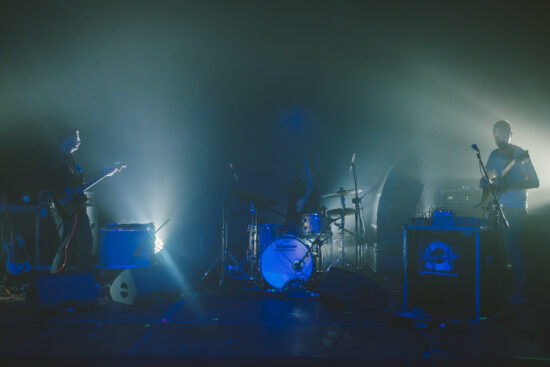Two important jazz bands from Tricity formed by musicians of the young generation have just released their third records. Algorhythm and Quantum Trio have given us bold and conscious albums, which represent genuine milestones in their careers.
Translation: Aleksandra Szkudłapska
When the line-up of your band is weakened, you can rearrange the music to make it work in a quartet rather than a quintet. Or you can chuck it all into a thermomix and see what happens. That’s what Algorhythm did – a band that for the past couple of years united conscious artists creating though-out, consistent music. I wrote about Piotr Chęcki, Emil Miszk, Szymon Burnos and Sławek Koryzno when they released their previous record, so I won’t repeat myself. In a nutshell, while on the one hand Algorhythm avoid jazz mainstream and academic influences, on the other, they don’t do jazz-like either, steering clear of music that would be more approachable for listeners not that used to the genre (think EABS). Slowly, from record to record, they shape their own peculiar language. While Mandala was an important step ahead, it is Termomix that represents their broadest and deepest exploration to date. At the same time, it shows the greatest diversity in terms of style – Algorhythm are too electronic for jazz, and too jazzy for electronica. Everything comes together here: airy, coherent dialogues exchanged by brass instruments, subsurface bass coming from the Moog and the unobvious, but deliberate drumming (“Lemon Zest”). There are quasi hip-hop moments (title track), when the band make a nod to Ninja Tune („The Recipe”), there are balanced jazz forms with surprisingly original arrangements (“The Ancient Snack”), reverberating killers that bring to mind the post-yass scene, which change completely halfway through the track (“Baba Ganoush”) and electronic passages verging on Warp Records with their dense synthesizers (“Hakuna Chakula”).
As it often happens with the thermomix, you get a lot of everything, but since the post-production process was much more complex than before, this is a very finetuned record in terms of sound, mixing samples and individual instrument tracks. Dense grooves meet acoustic percussion cavalcades, brass instruments are either coherent and sonorous or try to outshout each other, jostling about in the adopted form. The Moog&drums rhythm section is brilliantly emphasized here, either forcibly pushing forward (“Transgroove”) or tremblingly shifting the band towards the realm of the free, yet maintaining consistency and control throughout. This album is open to various concoctions of styles, coherent and cocky in its use of non-jazz means (take Chęcki’s synthesizer in “Obscure Specialities”, for example), offering a thought-out synthesis of all these elements. The quartet refused to go by tried and tested recipes – Termomix is their original dish, which combines their individual tastes in an appealing and innovative form.
While Algorhythm surprise us with the title of their record, with Quantum Trio it’s the cover that first attracts the attention, bringing to mind different associations and styles. It was designed by Kuba Sokólski, who previously worked with mostly guitar-based and metal bands such as Merkabah, Ampacity or Entropia. This cover, contrary to expectations, heralds what’s inside. Like Algorhythm, Quantum Trio do not use bass (from the outset), and Red Fog is their densest record to date, mostly on account of Kamil Zawiślak’s very intense use of the grand piano. While the album leaves room for more delicate melodies (the beautiful “Streams” right after “Hawk In”), yet the greatest magnet are the mathcore moments in their music: intense, impulsive, verging on the heavy side.
Quantum Trio’s sound has become mightier, their arrangements more dense – the music makes you want to add the adverb ‘more’ to almost any aspect: the solo parts, greater coherence of the musicians playing as a band, the way they hits the keys/drums, playing fortissimo, very determinedly. Yet this is not the case of running headlong: the music sounds coherent and transparent. Like the aforementioned “Streams”, which seems to stretch and formally open towards the end, but the piano leitmotif brilliantly keeps the whole piece in check. The same happens a moment later, when Luis Mora Matusz does what he wants on the drums in “Liquid Fire” – the fastest, most explosive track on the record – and just when it would seem that the drummer goes head to head with the rhythm, bringing his instrument to the boil, he fantastically closes the composition. Another important moment is the title track, balanced by the delicate and transparent “Passing Time” and “IBBI”. Quantum Trio are consistent in what they play, maintaining a balance of feelings – they have boldly entered a new path of impulsive, dense music, which shows a very potent take at jazz. At the same time, they remain sophisticated, skilfully dosing emotions. Red Fog demonstrates a balanced sound with many distinctive moments, full of unique character. The album cover hides a secret one has to gradually discover, listening until the end of the album – which is quite surprising, hammering home just how consistent and original this band really is.
Algorhythm, Termomix, Alpaka
LISTEN: 🎶Spotify, 🎶Tidal, 🎶Apple, 🎶Deezer
Quantum Trio, Red Fog, Emme Record Label
LISTEN: 🎶Spotify, 🎶Tidal, 🎶Apple, 🎶Deezer




